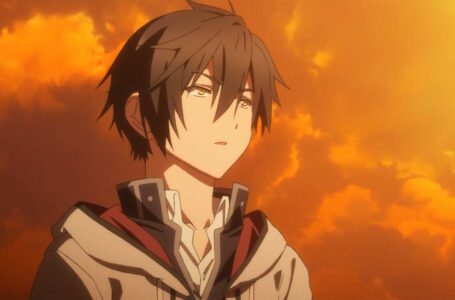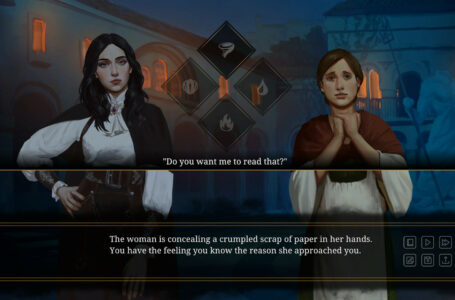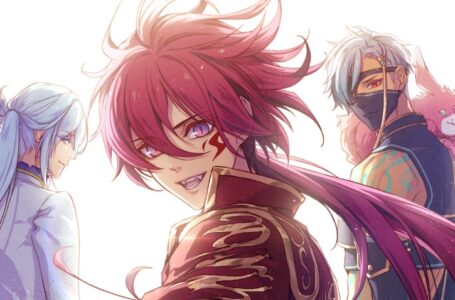Olympia Soiree’s challenging themes make for a wild ride worth taking
Olympia Soiree is an otome many gamers did not expect to see ever get localised. This is a fact that is unsurprising when you hear about its story details, as Olympia Soiree tells of a mature tale of discrimination, oppression and freedom. (We hate maturity here in the west. At least it feels that way sometimes – Ed.)
It makes for some uncomfortable parallels with our own world, and with sprinkles of violence and misconduct towards women on top of that — a narrative element which its scenario writer appears well-known for exploring — may be enough to dissuade others from giving it a chance. But please don’t turn away just yet!
Today, we are feeling thankful to Aksys for bringing over Olympia Soiree, and sending them our thanks for providing us with a review code for the game, which released on September 9, 2021. And it’s safe to say that both our own experiences and other reviews from elsewhere have shown that Olympia Soiree has proven to be a worthwhile investment.
Aksys’ lineup of upcoming otome games could not have started off any better than here, because we are happy to report that Olympia Soiree is a must-play — and a must-own otome for your collection. As long as you can stomach a few potentially triggering themes, that is, because its worldbuilding, characters, story, and steamy romance are all well worth the price of admission, no matter how polarising it may sound.
Let’s get into it, but have your snacks and drinks at the ready. This is going to be a long one. (I’m ready – Ed.)
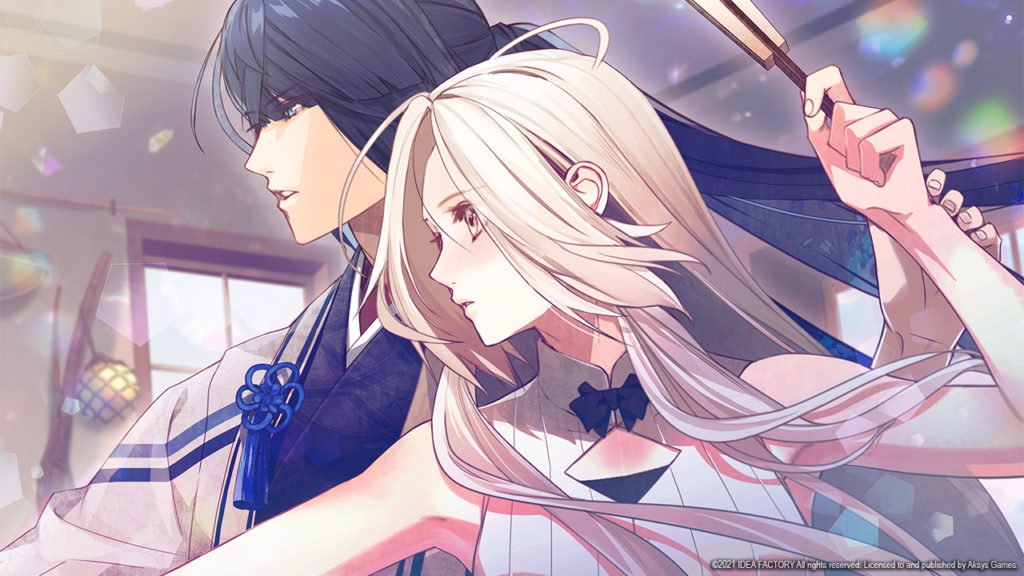
Synopsis
Olympia Soiree is set in the fantastical land of Tenguu Island, which was discovered and founded by the deity Hiruko. The land’s social hierarchy is determined by its colour caste system. The 3 primary colours of Red, Blue and Yellow are the highest within its society, each holding a different ability passed down through their own bloodline. The Blue have the ability to “punish”, referred to as “Batsu”; the Yellow are able to hear Hiruko’s Judgements; and the Red are able to obtain cursed land and blood.
The secondary colours also live on the Island, having been born when the primary colours married one another and had their own offspring, but they are denied romantic links with anyone of the lower categories. This is also expected of the primary colours. The lowest colour within the society is Black, while anyone of mixed heritage is exiled to the lowest level underneath this always shining and gleaming surface — Yomi, a poverty-stricken sector where its residents are deprived of the sun’s light forever.
Those who live on the surface can visit Yomi if they have a pass, but otherwise those living in Yomi have no contact with anyone above, meaning that those who were not born beneath the surface are unable to stay connected with their loved ones above. Love between different colours is frowned upon, and especially so if a primary colour is romantically linked to a Black or mixed — in this instance, punishments as severe as the death sentence can be carried out on the partner, with the primary colour being exiled rather than killed.
When it comes to Olympia’s standing in this world, she is required to perform a ritual dance only the White class can perform in order to keep the sun shining — it’s a tradition that celebrates their Goddess Amaterasu. These rituals have made her appear as though she is merely a doll ever since she was brought to Tenguu Land.
Olympia’s homeland was Tennyo Island, but her all-female clan was wiped out when Olympia was just five years old. She was taken in by Lord Douma of the Yellow clan, and was not given any freedom until her 18th birthday, where on the very same day, she was instructed by Akaza to find a husband within a year. If she is unable to, he will do the job himself and have her hand in marriage to keep her White colour retained for future generations.
And so, Olympia begrudgingly sets on a quest to bag a husband within the year, because there is no way she is accepting a man who is marrying her out of a sense of duty rather than loving her for who she is. Cue the lucky suitors!
The Love Interests
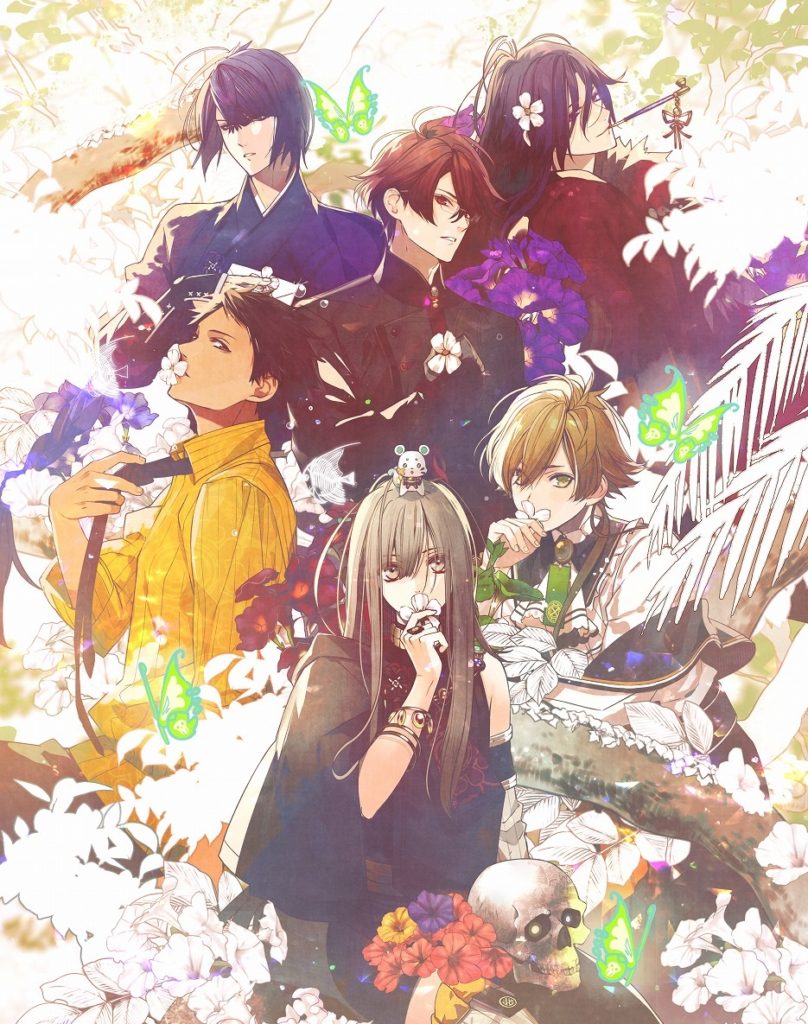
We’ll be going through the love interests in what is commonly agreed to be the best play order for maximum enjoyment — by following this order, the plotlines start off relatively basic and gradually extend to the wider circumstances of the overall story in later routes. Two of the love interests — Himuka and Akaza — are locked until the other four have been played due to how plot heavy they are, and therefore our recommended order for the story progression benefit is:
Riku -> Tokisada -> Yosuga -> Kuroba -> Himuka -> Akaza
Riku
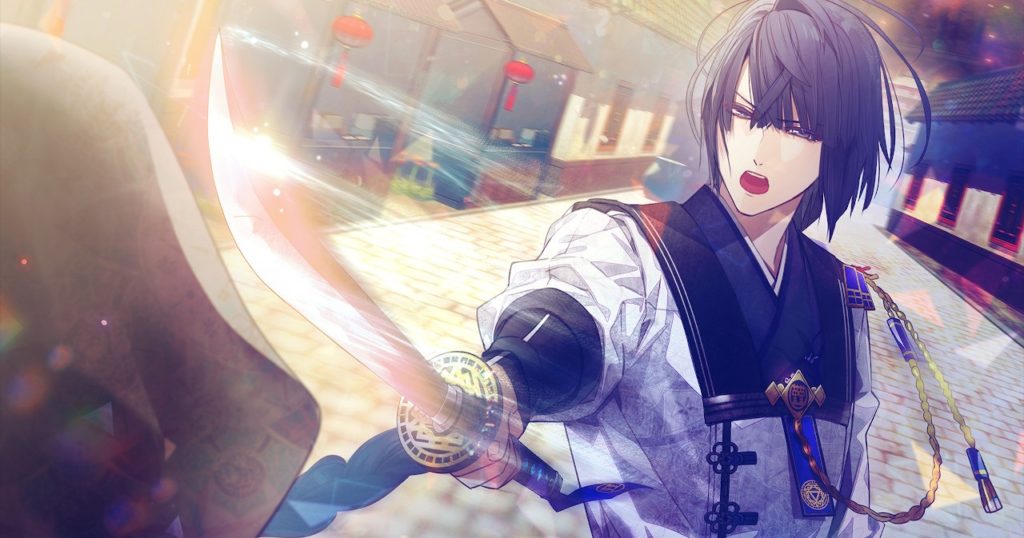
Nobunaga Shimazaka voices the standoffish, elegant Riku, having been previously seen in an otome called 7’scarlet as the childhood love interest Hino Kagutsuchi, as well as Napoleon Bonaparte from Ikemen Vampire, and Yamato Ipponmatsu from Storm Lover 2nd.
Riku is easily the best starting point for the game due to his character development; his route provides relatively little conflict, which allows players to ease themselves into this often rough and unruly world’s setting and rules as we explore how the Blue clan functions as a primary colour class. Just be mindful that the game’s bad endings are often very heavy and dark in tone, even within Riku’s mostly undramatic route.
Riku initially appears stoic and always acting in accordance with what is expected of him as a member of the Blue caste, and as a Yomi patrol officer, his initially cold and hardened exterior conceals a love interest not used to revealing his true feelings, and most definitely not used to experiencing feelings of love. He seems to fall into the archetype of a tsundere, but all of his flushing sprites and awkward journey in understanding and accepting his budding feelings for Olympia reveals he has a super soft and well-intending core to his personality.
His prim and proper exterior is easily dislikeable initially because he seemingly upholds the beliefs and traditions of the unfair colour caste system — he firmly believes that he will preserve the primary colour of the Blue by passing down said traits and his Batsu powers to his children by marrying a woman of the Indigo class. By meeting and falling for Olympia, however, he is at a complete contrast to how he initially appears within the common route, as well as his appearances within other love interests’ routes.
His relationship development with Olympia is one of the best to witness, and especially so as his route provides one of the few examples of Olympia taking the initiative during certain sexually charged encounters. It is such a refreshing move to see a heroine who may be as inexperienced as others members of the cast, but willing to show that sometimes all you need is the ability to be confident and assertive. The result is a very relatable and mature heroine. We’re off to a great start.
Tokisada
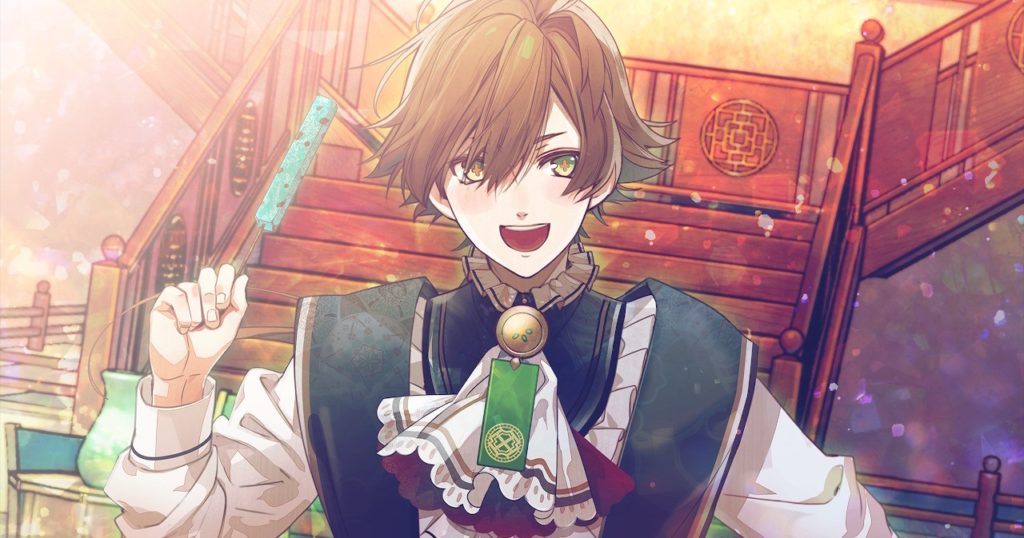
Yuto Uemura plays the energetic and adorable Tokisada, marking Olympia Soiree as his first endeavour in the genre. Some may know him already as the voices for Tamaki Amajiki from My Hero Academia, Motoya Komori from Haikyuu!! and Atsushi Nakajima from Bungo Stray Dogs.
Tokisada is the youngest of the love interests, being just one year Olympia’s senior. Since he is the shota archetype, I was not looking forward to his route as I have a tendency of not feeling particularly comfortable with younger love interests, but I was pleasantly surprised with his character, and he ended up being one of my favourite boys of the archetype ever.
I find this fact particularly shocking for how long he calls Olympia “onee-san” (or “sis” in the translation) throughout his route, but it just works and never got grating, instead acting as a great prompt for demonstrating an important turning point in their romantic relationship when he finally starts addressing Olympia by name.
Tokisada is classified as an “Outsider”, having drifted to the island’s shoreline a mere year ago, and he is still getting to grips with his new reality and setting. This fact makes Tokisada’s own character journey relatable to Olympia, acting as a parallel to her own upbringing and sense of not truly being a part of this island community. They ultimately complement one another really well, and Tokisada’s route provides a rare example of a love interest’s route being established as friends first, lovers second — especially so when we consider how their relationship is based initially out of obligation that subsequently turns into genuine feelings and ultimately sparks of sheer sexual awakening.
Seeing Tokisada fall head over heels for Olympia and unwittingly win her over through his caring and considerate words and actions — not to mention their shared values and desire to bring change to the Island’s colour system — is delightful to witness. And since they’re both so innocent and diabetically adorable, Tokisada is quite possibly my favourite match-up for Olympia. He also happens to be the only love interest who is a part of a secondary class on the Island’s upper level, adding a new perspective to how the land functions in comparison to every other love interest. My bias is strong here.
Yosuga
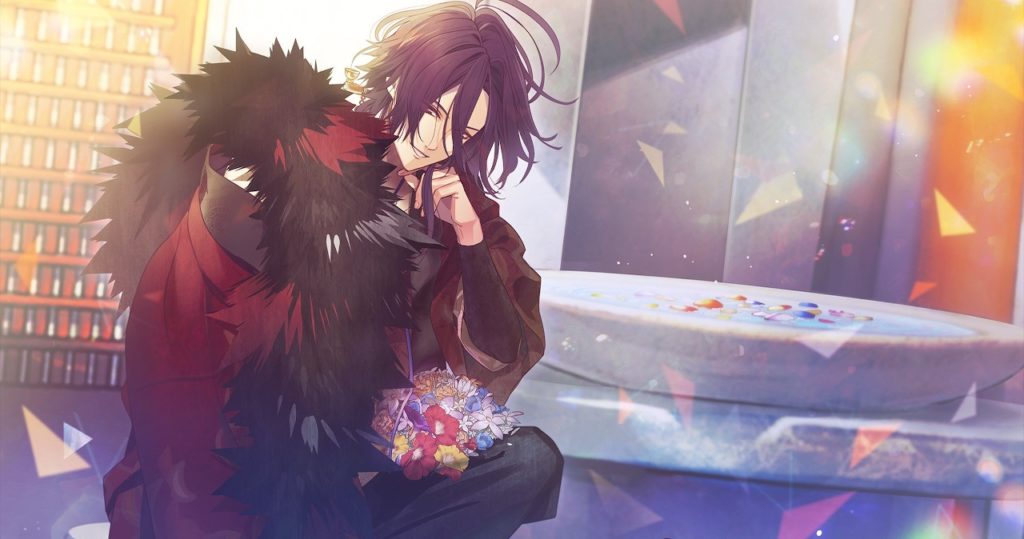
Yuuma Uchida voices the alluringly mysterious Yosuga, and is known for voicing love interests from other otomes, such as Matsuki Shuto from Liar! Uncover the truth, and Okada Izou from Ikemen Bakumatsu.
Yosuga is the flirty archetype, and runs the bathhouse within Yomi. His significance and standing within Yomi is impactful, as he acts as the unofficial leader of this bottom level of society by keeping order, defusing troublesome situations ranging from drunks to potential sexual assault, and ultimately protecting its citizens no matter the reason or process in doing so.
There is a silent kindness to his character, as seen by how he goes out of his way to build and provide helpful assets for Olympia without her knowledge. And despite his unruly behaviour across his route, the prevailing theme of fated lovers despite their surface differences is a guilty pleasure of mine to witness unfolding on-screen.
Yosuga is not only often the relationship advisor to Olympia’s pursuit of a husband outside of his route, but within it, he almost constantly attempts to deflect himself as a possible candidate — but of course, that just makes us fall for him harder, doesn’t it?
He is, as expected, the love interest with the trait of being the most mysterious, and is, in a number of ways, similar to Kei from Collar x Malice in regards to how their pasts have shaped their current traumas, and how it has resulted in the two sharing a death wish. Also his route’s bad ending is visually gorgeous, but contextually horrifying. This may be one of the best examples of how to pull off a shocking bad ending within the genre, and within Olympia Soiree, sometimes it works well like here — but other times it fails. More on that later.
There can be no denying that the level of sheer spiciness in his route does well to counterbalance the angst, with Yosuga being an absolute tease to Olympia, and his route even hinting at them getting it on off-screen mid-route. It also happens to be one of two routes I happen to favour over the others (explicitly his and Tokisada’s) for actually showing both male characters be so viscerally in tone with their emotions and cry. When Olympia Soiree gets it right, it really hits in being memorable and positive for showing great takes on its characters — and other times, not so much. Take for example, Kuroba next.
Kuroba
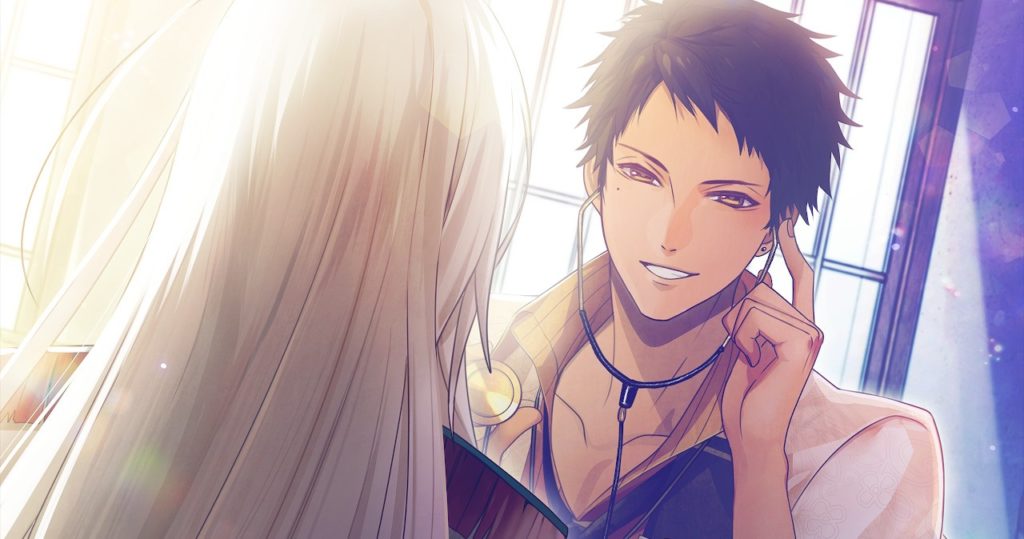
Tomokazu Sugita voices the smart and charismatic Kuroba, well established in the otome sphere for having voiced Ron from NORN9, the bad boy trash fire we all hate to love, as well as Sauli from BUSTAFELLOWS and Usagi-sensei from Bad Apple Wars.
Kuroba was immediately my favourite of the cast, sounding like an absolute playboy but with no evidence to back it up as he cheerfully enjoys reminding us that he is “married to every woman on the Island”. Despite his playful teasing, he is an honest and hard-working individual who has risen up the ranks in the land’s medical field despite him being from the Black class, the lowest ranked colour of the system. He is an exceptionally brilliant doctor with a heart of gold, providing free healthcare to citizens of Yomi, and doing his utmost to find a cure to a disease that covers its victims in crystals and removes their natural colour.
So it is such a shame to report that his route does no justice to his attractive and enjoyable character. The route is plagued with poorly placed and forced misunderstandings, whereby Kuroba acts far too immature for both his age and his archetype. It is a massive disappointment, not at all aided by his route also featuring a bad ending I absolutely loathe — a sudden behavioural change without any build-up or reasoning is one of my biggest pet peeves with the otome genre as a whole, and this particular instance doesn’t make me feel any better.
That said, the way in which Kuroba’s route focuses on the disease that plagues the land is very interesting — and a narrative element exclusive to this route. Another positive note of the route is with Olympia herself, who acts really head-strong and assertive here when it comes to her relationship with Kuroba.
On the other hand, Kuroba’s route manages to feature some of the most horrifying moments of the game, such as terminal illness, character deaths, and sexual misconduct (even accompanied by a CG). I want to say all this heaviness is counterbalanced with Kuroba’s carefree character, but there’s ultimately no saving a lacklustre route, romance wise.
But luckily things really pick back up as we get to the unlocked, plot heavy routes of the final two love interests.
Himuka
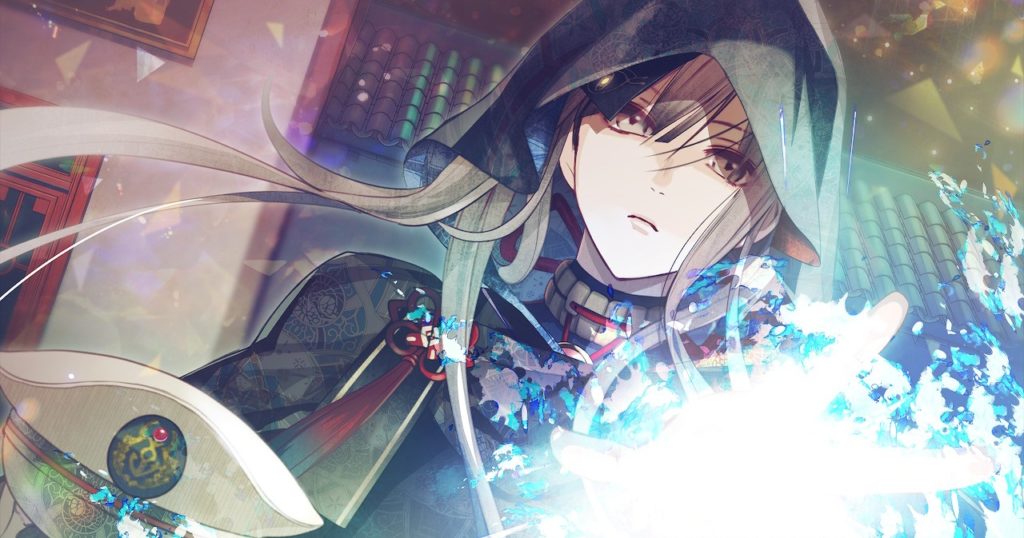
Shun Horie is up next for playing as the eccentric Himuka, who has previously voiced Nagi from EPHEMERAL, as well as Linhardt from Fire Emblem: Three Houses, Aether from Genshin Impact, and Olympia’s very own pet companion, Daifuku! Her biggest fan is a lot closer than she would think.
Himuka works as the Island’s Funeral Director which has him “paying respect” to the dead by turning their bodies into crystals. He lives alone and is rarely seen conversing with others due to his shy, reserved and awkward personality, but all this changes when he meets and becomes fixated on Olympia.
Since his route is massively spoiler-heavy, we won’t be delving too much into it here, but the amount of story details and truth bombs within his route alone does considerably more damage to the payoff of him being a love interest. While his route is high in tension and drama, with so many reveals and plot threads coming up that were previously foreshadowed in past routes, the overall romance and relationship building between Olympia and Himuka feels oddly amiss here and is very lacking compared to the other love interests’ routes.
In contrast to just how heavy the spiciness and high level of romance is in the past routes, Himuka’s route is a massive let-down in this regard, and especially so with how the sexual moments between the pair are noticeably far less and shorter compared to every other route.
It definitely sticks out in this way, but if we’re talking just about the overall story, Himuka’s route most definitely provides a wild ride worth getting to after the four mandatory routes. But at the same time, the game gets extremely dark and uncomfortable even outside its bad endings here — so as yet another reminder, be sure to familiarise yourself with the themes Olympia Soiree covers before starting this route at the very least!
Akaza
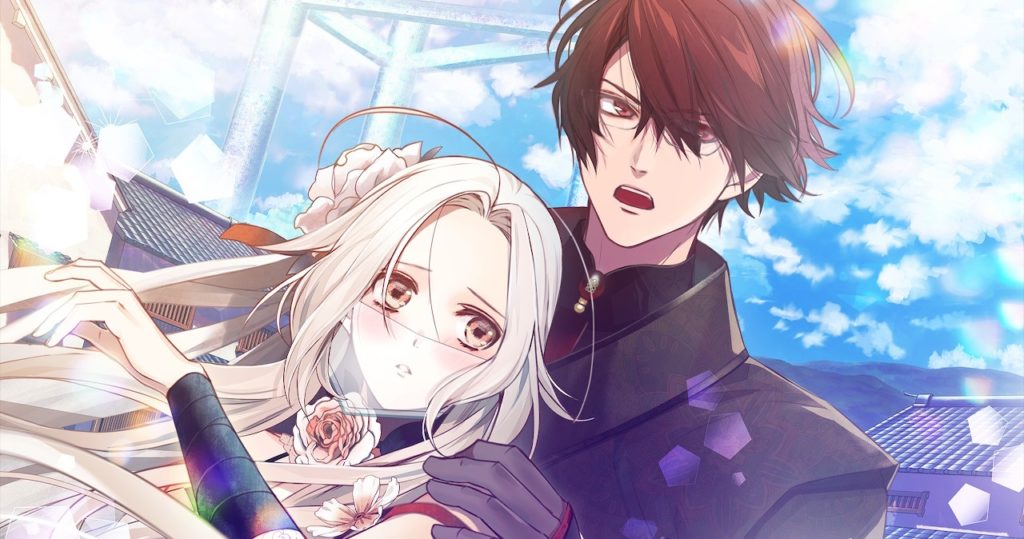
Matsuoka Yoshitsugu is probably the most well-established name in the cast — he has voiced numerous love interests before, such as Ame from Re:Birthday Song, Alice from Taisho x Alice, Monshiro from Psychedelica of the Black Butterfly, and Rin Okazaki from Spiral Memoria. He plays the assertive and capable Akaza, and it is a treat to hear his voice for an older, more stoic character. Akaza is a calm and collected young man, who seems to be all about work and order and shows little to no emotion. He is this otome’s resident kuudere, in other words.
What is worth mentioning here is unlike Himuka’s route, a lot of the reveals here can probably be guessed before they are exposed. It is most definitely not as shocking as what we had just experienced, but that in itself is not that disappointing after the gut-punches in Himuka’s route.
The route is very satisfying in its wrapping up of various plot threads, with a major emphasis on its progression linking first and foremost to the revelations concerning the Island’s past. While such a plot-heavy route put something of a dampener on Himuka’s character development, the same can be said for Akaza to a certain extent — but not with quite the same effect.
Akaza is effortlessly perfect. He is quite literally the “soul mate” that the game always reminds Olympia to find through a particular flashback to time with her mother when she was younger. And this is the whole point of a poster boy of course, being seen as the lead love interest that the main character ultimately “should” get with. Even side characters and every single unnamed character frequently mentions how Akaza is clearly the only valid choice for a husband across the common route, and at the start of the other love interests’ routes.
I simply have never liked this sort of forceful push towards a game’s “main” love interest being the perfect pick of the cast because most of the other love interests — if not all of them — tend to be more complex and interesting, and most importantly, genuinely and lovably flawed.
This is especially apparent when the game’s entire premise revolves around bringing equality and freedom to those seen as less desirable or fortunate — because if I had it my way, Akaza would have not been in a primary colour clan. It would have come across as more genuine and emotionally gratifying, but this should be a whole new talking point for a different article’s worth another time.
On a final note, Olympia acts completely tsundere here, as we should have expected with how she consistently denies ever considering Akaza as a potential husband following the game’s initial setup. Her attitude here is such a far cry from how she behaves in every other route, which is refreshing and gives their chemistry a very different and special dynamic. But she also retains her best characteristics as she takes the initiative on her own by standing up for herself. I admit it is still a very solid and enjoyable route, and Akaza remains a terrific love interest despite everything.
But speaking of Olympia…
The Heroine
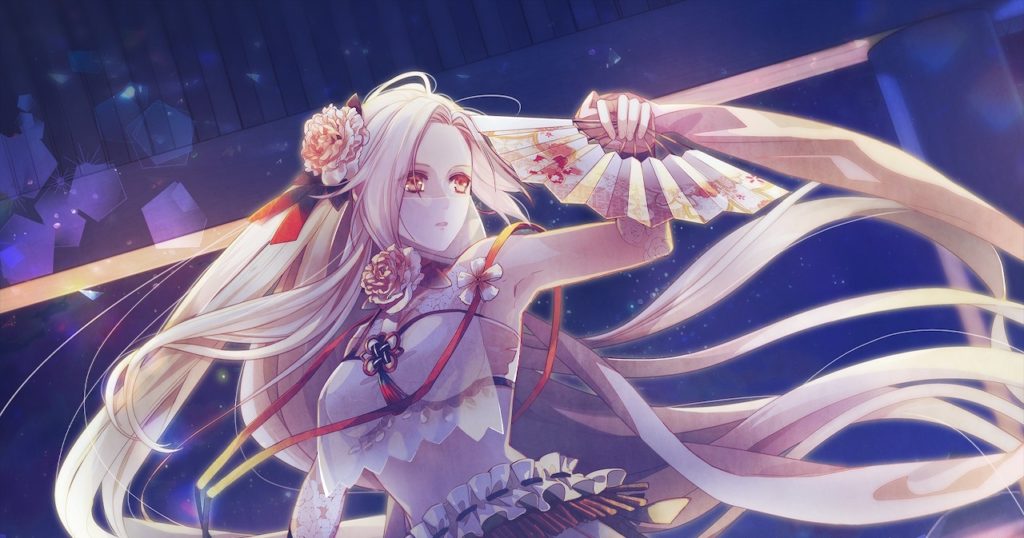
We save the best for last with the main cast, with Olympia herself. I really enjoyed her. Olympia is the default, voiced name of Olympia Soiree’s heroine, and both her name and “true name” can be changed.
In some respects, Olympia is like other examples of naïve, sheltered heroines such as Cardia from Code: Realize, Enju from Nightshade and Cloe from EPHEMERAL. She has lived no differently to a moving and breathing doll without her own real voice or ability to express herself, her values or even a shred of her own personality. But despite this naivety coming through on many an occasion, one of Olympia’s most interesting, differentiating traits is the delight she takes in explicitly thinking about and enjoying sexual discussions and activity.
And yet, Olympia is the absolute definition of purity — she is of the rare and highly sought after White bloodline, explaining on its own as to what her appeal is to the love interests. But it’s not just this, as Olympia demonstrates true perseverance and a kind heart that seeks a better world for others who are less fortunate than herself. She is not only vocal in her beliefs, but she also actively pursues justice for those inhabiting the land. Thereby her goals provide plenty of narrative drive for Olympia to grow, and for the game’s story to develop.
Her keenness to learn is integral to her character; she seeks to understand those around her, as well as the island’s history and colour system in order to better understand her own standing. She even sets up a mail delivery service as a way to provide a connection between those having been born or condemned in Yomi and the surface as her own first step to improving the island in the common route.
In every route, it’s an exciting prospect to see her sprite and CGs show her hair colour change to match her love interest, as due to her bloodline, growing closer to a romantic partner and indulging in some frisky business results in her white hair absorbing her lover’s colour. On a similar note, you learn to look forward to her dropping her real name with her love interest, acting as vocal confirmation of her trust and love for that individual. It never fails to be heart-warming and adorable.
And finally, Olympia is totally relatable. From her inner monologues, to her being either a complete blushing mess or actively pursing and initiating romantic gestures, she’s effortlessly endearing, and behaves as a true reflection of the player. This is especially the case during the times she both unknowingly and admittedly thirsts for the love interests as much as we do, and having ideals we support and want to see her succeed in makes for an overall positive and enjoyable heroine.
On a final note, Daifuku, her pet mouse, is adorably supportive, and provides a lot of humour as we can understand what he says as an outside observer — but Olympia is none the wiser that he is having a full-on conversation with her. Daifuku proves once again how much I adore the trope of an animal side-kick!
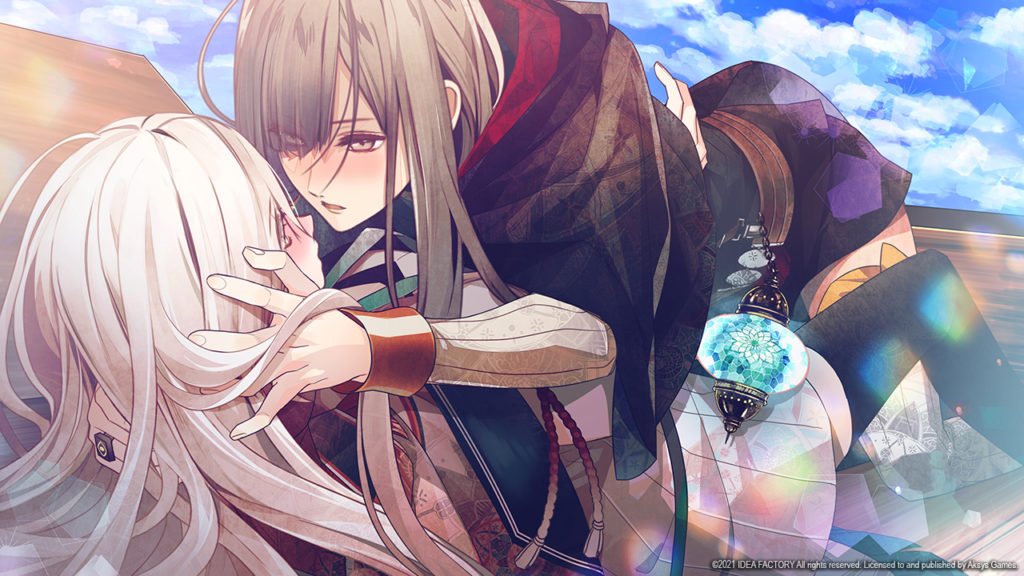
Overall thoughts
Localisation
We’ll keep this section brief and straight to the point as this is one major area that deserves its own section because of the all-important translation. Olympia Soiree is a massive step up from Aksys’ most recent releases. There are very few grammatical errors I noticed across the game and all routes, and I noted no more than 6 typos and/or instances of missed punctuation in my own play-time. There were no issues with text flow in the dialogue box, nor any font issues, either. This is well worth paying full price for the game, both in terms of its content and its excellent localisation.
Thank you for listening to your consumers, Aksys!
Art, sound and UI design
As a starting point to this hefty section, we must start with where the game’s main visual draw is: the gorgeous art! Satoi is the artist of Olympia Soiree, best known in the west for the otomes Diabolik Lovers, Ozmafia!! and the ReBirthday series.
As expected of the talented artist, the artwork from backgrounds, to sprites and especially the character designs are all breathtaking. There’s plenty of animation, too, with lip syncs, blinking, and lots of expressive illustrations to fit the events and mood. And with the lush fantasy setting, Satoi’s designs and the overall colour scheme really burst, making each and every environment and character simply wonderful to look at.
While the music is not immediately a stand-out element, the very best of the 24 tracks are played during the height of emotional and romantic moments. This is probably not a surprise, but it may be worth pointing out since the majority of the time spent in routes is in both Yomi and the surface areas, contained within the same locations. It means that certain tracks are looped quite frequently; this is especially noticeable during longer playtimes of the title during a single sitting.
While the location-based tracks are most certainly cosy and fitting to the overall tone, the occasions when the drama and sexual tension kicks in are even more exciting and emotional with the accompanying switch to lesser-heard musical tracks; this does a wonderful job at conveying the intended emotions of the scenes to maximise the moment’s impact.
The game’s opening number also gets better with each listen and watch of it, while its ending songs are immediately captivating, and excel at hammering into us the emotional finales of each route’s ending.
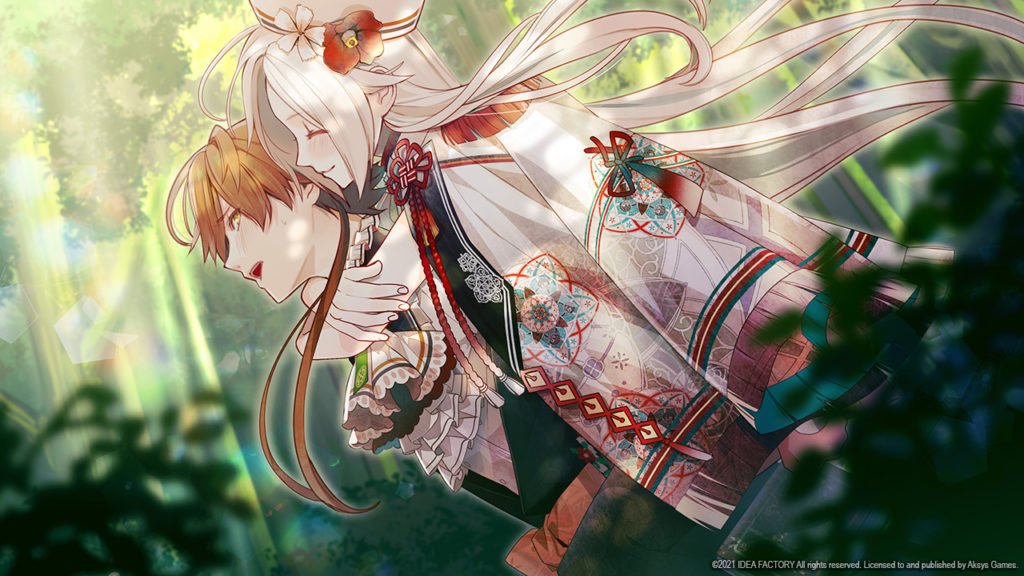
A lot of the voice cast are not that familiar to the otome sphere, making the characters all the more exciting to get to know as we see recurring archetypes being presented by some newish or otherwise unfamiliar voices. And all of them did an incredible job, from Shimazaka portraying the adorable mess of the soft boy Riku, to Yoshitsugu’s consistently raunchy tone as Akaza — seriously, prepare to be blushing far too many times in this route alone. And I am obviously, especially excited to hear more of Tokisada’s voice in another otome game. Please give us more Uemura!
The spice level across the game, and especially in its good endings, will be turning heads for all of the right reasons. The accompanying CGs, voice acting, and dialogue are some of the filthiest my blessed eyes and ears have ever seen for an otome on a console platform, and alongside the high amount of romance across its routes, Olympia Soiree will be one of the most recommended titles for anyone more partial to wanting this aspect as a central point of their otome games.
The UI design is overall nice and simple to navigate through, and aptly runs with the main theme of colours, retaining a fittingly whimsical and artistic flair of Asian-inspired designs and floral patterns. The game’s choice indicators are also highly suitable as part of the overall package’s design, as represented by a dial. It indicates the “good” response on its “sun” side, and the “moon” side as the “bad” option. You can turn this display off if you’d rather play the game blind, which is a nice option to include, and there are three different endings for each route: good, bad and tragic.
There are no choices to make in the common route; instead, you simply select the character you want to pursue as a choice in the common route’s last scene. Simple and effective.
A really neat detail in the main menu is that it changes according to the time you boot up the game, visually depicting the beautiful crashing waves around the island at different times of day. It’s similar to what Piofiore: Fated Memories does, and is accompanied by voiced lines which will be delivered by the most recent love interest whose route has been cleared — but these come without subtitles, meaning that these lines are not translated.
The extra goodies within the Treasures section are well worth exploring once you finish routes, with plenty of new information to read up on! This section adds further backstory of many of its characters, including side characters. It adds further explanation of their own thoughts, feelings and personal events that deepens your understanding of them.
And this goes for the love interests, too, where they each have a short story, introductory “interview”, and further backstory events. I especially appreciate how more subtle links between the love interests can be discovered here, such as Yosuga having been a childhood friend of Kuroba’s, and Riku and Akaza being good friends. And who doesn’t want confirmation of what each love interest’s favourite body part is? (I won’t even mention anything blatant here, each one is well worth learning of yourself!)
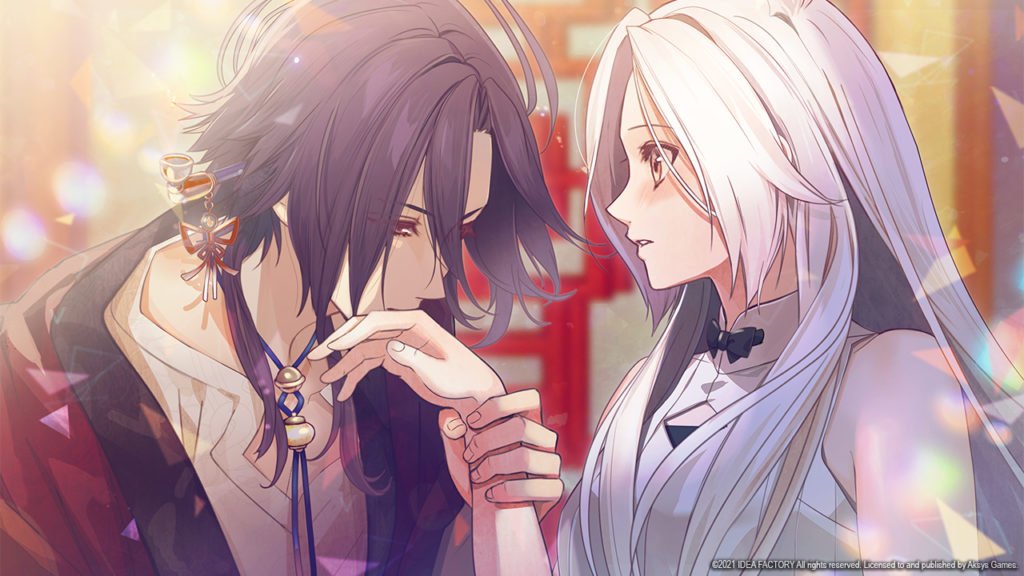
Story
To be brutally honest, before getting into Olympia Soiree, I was not expecting anything on the same level as Café Enchante, Collar x Malice, or Sweet Fuse: By Your Side. The simple synopsis described a supposed Utopia where misogyny and violence against women is frequent, and the realistic, detailed system of discrimination based on colours drew some uncomfortable parallels to our own world and did not sound that enjoyable or rewarding.
There is, after all, a reason many suspected that the game would never get a localisation — obvious parallels can be drawn between the privileged position of Olympia’s White class and the concept of real-world white privilege, and likewise the concept of the Black colour class being at the bottom of the hierarchy is something that a fair few people will probably find a tad questionable.
But Olympia Soiree manages to present a story both tragic and hopeful, with the majority of its characters actively wanting and pursing a system that will treat all of its islanders fairly, with the colour system itself being continuously frowned upon and vocally disliked by said characters. And characters you will aggressively dislike are few and far between — off the top of my head, I can think of only two characters who fit into this category across the entire game.
We have also frequently mentioned just how heavy the game tends to get, especially in regards to its challenging themes and shocking endings that perpetuate how cruel and unfair the world can be. But this does make for a surprisingly mature and adult otome, and we rarely ever get such approaches and writing in our dear maiden games — especially so on console systems.
My main and only disappointment with the game’s endings is that I have always had an issue with bad endings that are either hammered in for the sake of shock factor, and especially when characters act out of character, or show characteristics that they never presented in the rest of the game.
One route’s bad end in particular is unforgivable to me for its events coming out of seemingly nowhere, and when all the bad endings are super short — barely half an hour in length — the reasoning behind such sudden and twisted actions cannot be understood or accepted; they need so much more fleshing out. And even in the good endings, the majority of them are left open-ended, where the often discussed topic of the world’s future is left without any real sense of closure. But I’m sure this in itself hints at a possible future fandisc?
As you can probably guess from the synopsis, the game’s common route, which is as long as the love interests’ dedicated routes, does well in setting up what you can probably suspect will be the major conflicts within the routes, and their relevance to the overarching story. And as each one manages to be varied in its characters’ links to the colour system, they provide very different sides and approaches to its central premise. The worldbuilding of Olympia Soiree is absolutely fantastic, with each love interest’s route touching on the deeper, inner consequences of such a society but only ever really scratching the surface, adding layers of intrigue and depth to its complexity.
The foreshadowing of Olympia’s origins and revelations of the land and history were all thrilling to see uncovered in its locked routes, as its four unlocked routes explores how the land currently functions in present times. Finally, the game is on the lengthier side and will keep you well and truly preoccupied until the next Aksys title Dairoku drops in December, with a runtime possibly exceeding well over 60 hours to complete depending on your reading speed.
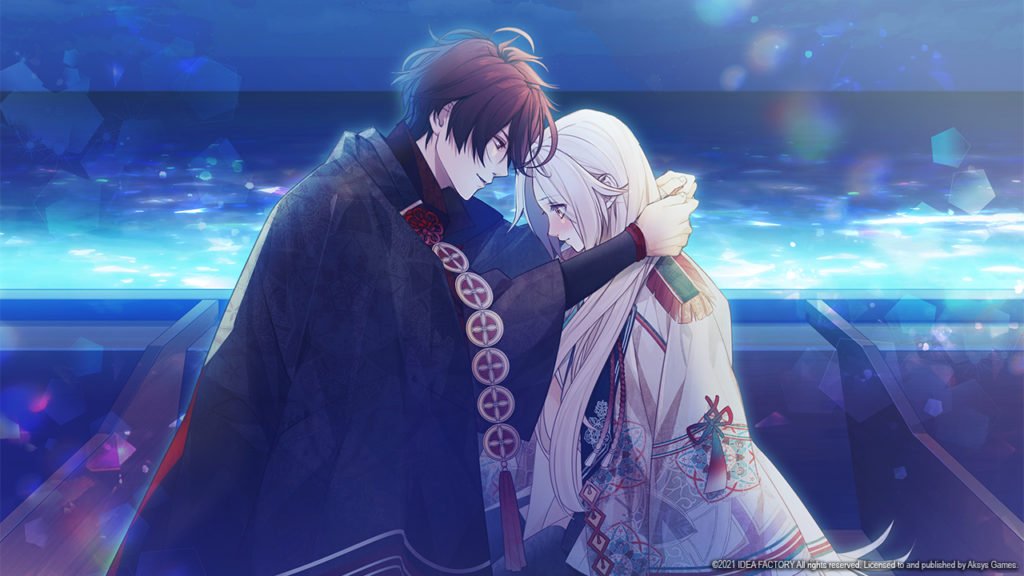
Characters
Characters of the game, as well as the land’s history and lore are based on real myths and legends of history, but looking them up while playing the game will spoil certain plot-threads and later revelations, so I encourage only reading up on its extensive glossary for all the information you need without spoiling yourself too early on its story.
Speaking of characters, the game manages to not only house a vast amount of supporting characters, but gives the majority of them integral parts to the story. Many of them will be popping up across multiple routes for various reasons, and some even show far more depth than you would otherwise expect.
This is especially the case when delving into the Treasures section of the game I previously mentioned; its Short Stories section adds a wealth of information, backstory and reasonings behind multiple characters who do not get enough coverage or information in the main game. It was a great move to implement this, and adds a surprising amount of post-game content.
Some standout characters explored through the Short Stories include Asuha, Camellia, Kaina, Fusou, Douma and Shura. If I had one nitpick about the side characters, it is how not all of those who are named and seen in multiple routes have a sprite; a bit of a missed opportunity, for sure, especially considering how frequently some of them appear.
I enjoyed how the game went about the prevailing topic of “soulmates”, which nicely links to no-one ever having one in their lifetime in our own world, as there are many candidates out there for each and every one of us. And while the game still reinforces a most important main boy as the “true” husband choice, the title still seems to compliment its other love interests through the various ways in which they are linked to Olympia.
Each love interest has their own reason for being with Olympia, and they work, be it because they have an understanding of their shared circumstances and hardships, or because something links them specifically to their younger years. It was a nice touch and always felt different but with the same gravity and emotional punch, unlike what 7’scarlet attempted to do which always felt too copied for each character, resulting in their similarities feeling farfetched and unbelievable.
And speaking of believability, let’s discuss the romance. There’s a lot of it here, with the romance developing at a quick pace, as evident by the meeting and coupling up between Olympia and her chosen love interest taking place within the space of a month.
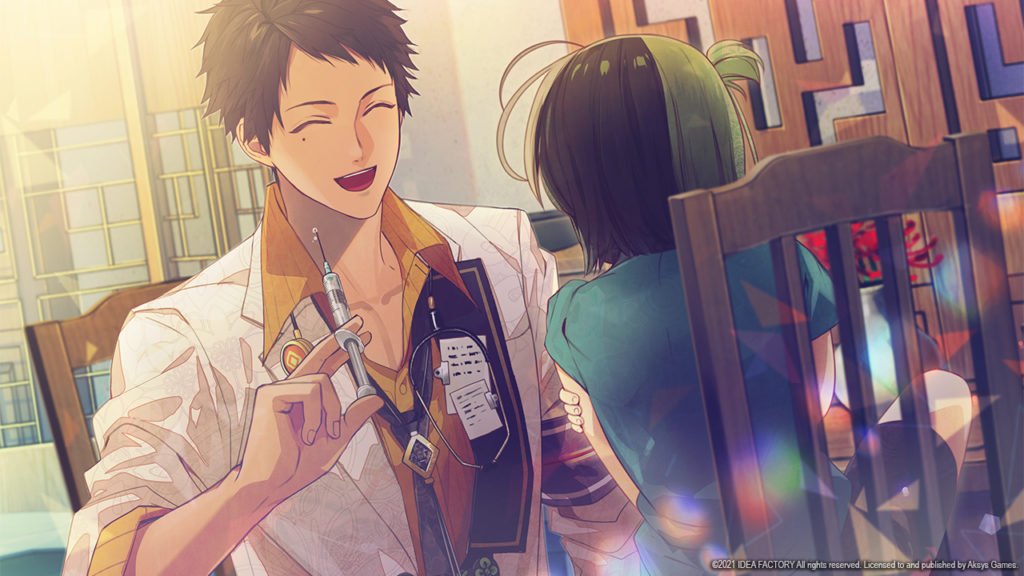
I know her whole mission was to find a husband but she did have a whole year, right? On the other hand, the speediness of the relationships being developed meant that the pace was consistently engrossing and never ran out of steam. And the majority of the relationships felt truly organic and believable, with only one unfortunately suffering with poor pacing that meant the story and romance didn’t quite mesh together.
Because two of six of its routes are focused in delivering details of the world’s history, lore and overall sense of worldbuilding, they result in an overload of information at the expense of witnessing a believable blossoming romance develop. While it is easy to admit that this was mostly the case with Himuka, it provides a very pleasing balance of romance and story overall — but it still feels like it was a disservice to Himuka especially, who really did get the short end of the stick here.
On a final, more positive note, it was a pleasant surprise to see how in tune the majority of its love interests are with their emotions, showing a couple of them crying on screen and in CGs when dealing with their trauma or current situations.
These moments in particular struck a chord with me for being such positive takes on its male leads, reflecting well on Olympia as a supporter to the love interests, and visually presenting them growing even closer to one another through confiding in and relating to one another. It may very well be the best takeaway from the game amid all the tragedy and angst.
In the end, I have a feeling most players will feel the same way as I do with Olympia Soiree — they will either love the love interest or the story revealed within the love interest’s route, so there is an element to be enjoyed within each and every chapter.
Ultimately, Olympia Soiree is the whole, entire package – you’ll want to play it for the layered story, (mostly) lovable characters and steamy, high amount of romancing. It’s exceeded my expectations and surprised me in some ways too (thanks for existing, Tokisada!) — and horrified me more often than not.
I said it once and I’ll say it again, what a wild ride it has been.
Join The Discussion
Rice Digital Discord
Rice Digital Twitter
Rice Digital Facebook
Or write us a letter for the Rice Digital Friday Letters Page by clicking here!
Disclosure: Some links in this article may be affiliate links, which means we may earn a small commission if you make a purchase after clicking on them. This is at no additional cost to you and helps support Rice Digital!
- Sigh of the Abyss: Shadow Bonds – Prologue Review - October 7, 2023
- Is She The Wolf? is wickedly addicting TV - October 6, 2023
- The steady consumption of Slow Damage - October 5, 2023




